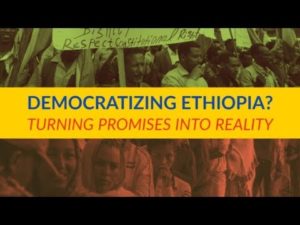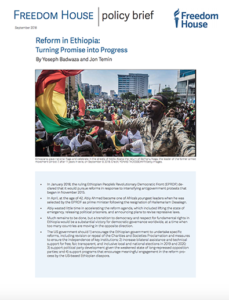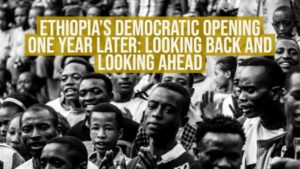Abiy’s promise to transform Ethiopia into a full-fledged democracy has earned him widespread praise abroad — and is why some Ethiopians aren’t as worried as they once were that speaking critically of the government could lead to a knock on their door by the intelligence services. But the openness has also laid bare a deeply polarized country, riven by political and ethnic rivalries entrenched by Abiy’s predecessors. Rather than uniting the country, democratic politics could derail violently right at their outset in Ethiopia, especially if Abiy’s government denies the opposition space to campaign openly.
‘Preaching democracy but being a dictator‘?
 The power of Abiy’s Prosperity Party “in the coming election will draw on the fear of ethno-nationalism, for people’s personal well-being — and even the survival of the nation,” said Abel Abate, an Ethiopian political analyst. “But there is lots of nervousness, lots of tension, lots of suspicion toward the PP from all corners of the country.”
The power of Abiy’s Prosperity Party “in the coming election will draw on the fear of ethno-nationalism, for people’s personal well-being — and even the survival of the nation,” said Abel Abate, an Ethiopian political analyst. “But there is lots of nervousness, lots of tension, lots of suspicion toward the PP from all corners of the country.”
The Ethiopian government should immediately lift the shutdown of internet and phone communications in the Oromia region. The two-month-long shutdown has prevented families from communicating, disrupted life-saving services, and contributed to an information blackout during government counterinsurgency operations in the area, Human Rights Watch said today:
Since January 3, 2020, the authorities have disconnected mobile phone networks, landlines, and internet services in western Oromia’s Kellem Wellega, West Wellega, and Horo Gudru Wellega zones. In East Wellega, residents reported that the internet and social media services were blocked, with text and cell service available only in major towns. The shutdown has been imposed in areas under federal military control and comes amid reports of government military operations against the armed wing of the once-banned Oromo Liberation Front (OLF). The media have credibly reported human rights abuses, including accounts of killings and mass detentions by government forces.
 “The Ethiopian government’s blanket shutdown of communications in Oromia is taking a disproportionate toll on the population and should be lifted immediately,” said Laetitia Bader, Horn of Africa director at Human Rights Watch. “The restrictions affect essential services, reporting on critical events, and human rights investigations, and could risk making an already bad humanitarian situation even worse.”
“The Ethiopian government’s blanket shutdown of communications in Oromia is taking a disproportionate toll on the population and should be lifted immediately,” said Laetitia Bader, Horn of Africa director at Human Rights Watch. “The restrictions affect essential services, reporting on critical events, and human rights investigations, and could risk making an already bad humanitarian situation even worse.”
The concern over deepening ethnic divides seems to portend a future at odds with the plaudits Abiy received after initiating his raft of reforms,* the Post adds.
“The government will apparently continue to do what it has done in the past: restrict public space while allowing the ruling party to use them abundantly,” said Abate. “Instead of an opening of political space, it may ultimately be a narrowing.”
*The focus of a recent National Endowment for Democracy (NED) forum.

 Africa’s second-most populous country is heading into its first multiparty campaign season after Ethiopia’s prime minister,
Africa’s second-most populous country is heading into its first multiparty campaign season after Ethiopia’s prime minister, 





